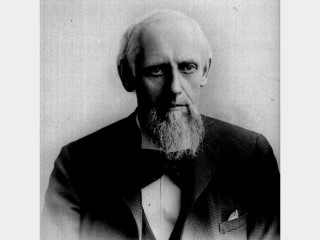
Amos Niven Wilder biography
Date of birth : 1895-09-18
Date of death : 1993-05-04
Birthplace : Madison, Wisconsin
Nationality : American
Category : Famous Figures
Last modified : 2010-11-27
Credited as : Poet and scholar, minister and literary critic, theology professor
The American New Testament scholar, poet, minister, and literary critic Amos Wilder was a seminal interpreter of biblical language. His work showed the need to understand how much imaginative vision underlies the language of early Christianity, as well as the theology and literature of the 20th century.
Amos Niven Wilder was born on September 18, 1895, in Madison, Wisconsin. His father, a journalist with a doctorate from Yale, worked at the U.S. consulate in China. His mother was the daughter of a Presbyterian minister. Pulitzer-Prize-winning writer Thornton Wilder was his brother. After two years at Oberlin College (1913-1915), Wilder interrupted his education to volunteer in the American Ambulance Field Service in 1916. In World War I he served in the U.S. Field Artillery and was awarded the Croix de Guerre.
Resuming his education, he graduated from Yale in 1920. He also studied at the Faculte de Theologie, Montauban, France (1919), the University of Brussels (1920-1921), and Mansfield College, Oxford University, England (1921-1923). In college he was a champion tennis player, and he competed at the Wimbledon tournament in England in 1922. Wilder's first book, Battle Retrospect (1923), was a volume of verse about his war experiences. In later years he published several other collections of poetry.
His keen interest in the New Testament dated to 1922, when he served briefly as a secretary to Albert Schweitzer at Oxford. He completed his study for the ministry at Yale in 1924, was ordained a minister, and was pastor of the Congregational Church in North Conway, New Hampshire, from 1925 to 1928. He then entered graduate study in the field of the New Testament at Yale. During his graduate years he studied at Harvard Divinity School (1929-1930) and taught at Hamilton College (1930-1933).
After earning his doctorate in 1933, he began teaching at Andover Newton (1933-1943). In 1935 he married Catharine Kerlin and their union lasted 58 years until his death. He taught at Chicago Theological Seminary and the Federated Theological Faculty of the University of Chicago (1943-1954) and at Harvard Divinity School (1954-1963) as Hollis Professor of Divinity, teaching New Testament interpretation.
Although he officially retired in 1963 and became Professor Emeritus at Harvard, Wilder continued to write on the literary art of the New Testament. His analysis of the oral forms and novelty of speech of early Christianity stimulated
an entirely new vein of literary and interpretive studies by New Testament scholars.
Wilder occupies a unique position in American literary history, combining the vocations of poet and scholar, critic and pastor. He brought together the heritage of the Bible with the visions of the 20th century. His wartime experience recorded in his early poetry opened him up to the catastrophic depths of humanity, while his vision of hope, derived from his biblical story, allowed him to press beyond the negative limits of his time. His poetic eye enabled him to see connections between the Bible and literature, the Kingdom of God and modern ethics, religious experience and contemporary symbols.
The appreciation of the depths and multi-dimensionality of language led Wilder to reject any reductionist interpretation of biblical material. In order to understand the historical evidence of the First century imagination and heart, Wilder employed a wide-ranging mode of interpretation, using literary criticism, social psychology, the studies of archetypes and folklore, and anthropology.
Wilder's inclusive mode of interpretation differed from other New Testament scholars, particularly in the relation of scripture to social ethics. In contrast to the existentialist position of Rudolf Bultmann, Wilder maintained that an individualistic approach did not do justice to the full dimensions of the New Testament message. For Wilder the revelation of God comes through the New Testament's varied symbols and myths, which need to be interpreted in their socio-historical context. Once interpreted, these mythological expressions can speak to the social dimension of humanity and open up the possibility of seeing the corrupt structures of present society.
The challenge to link the issues of the contemporary world with the biblical story came not only from Wilder's experience with postwar poetry but also from his pastoral sensitivity. His critical works on modern literature as well as his ecumenical endeavors attempted to lead beyond parochial and dogmatic limits to an enjoyment of the deeper and wiser vision of faith.
Wilbur also wrote extensively on the relationship of religion to modern poetry and literature. He also wrote about the life and work of his brother, Thornton Wilder. Before his death at age 97, the tireless Amos Wilder had just completed a book that brought him full circle to his seminal wartime experiences, Armageddon Revisited (1993).
Kerygma, Eschatology, and Social Ethics (1966) and Early Christian Rhetoric, The Language of the Gospel (1971) provide readable access to the thought of Amos Wilder. His work New Testament Faith for Today (1956) is a well-written attempt to make sense of biblical interpretation for the general reader. Eschatology and Ethics (revised 1950) remains the essential work for a critical understanding of Wilder's biblical scholarship. Awarded the Decennial Bross Prize, Modern Poetry and the Christian Tradition (1952) explores the relationship of Christianity to culture. The New Voice (1969) continues Wilder's literary and theological criticism. His book Theopoetic: Theology and the Religious Imagination (1976) is a brief but seminal work of Wilder's interdisciplinary concerns. A fine collection of his essays can be found in James Breech, editor, Jesus' Parables and the War of Myths (1982). A collection of his selected poetry is Grace Confounding (1972). A critical appraisal and scholarly discussion of the work of Amos Wilder is John Dominic Crossan's A Fragile Craft (1981). A career summary and bibliography (up to 1978) of Amos Wilder was compiled by Arthur J. Dewey in Semeia, vol. 13 (1978).
















